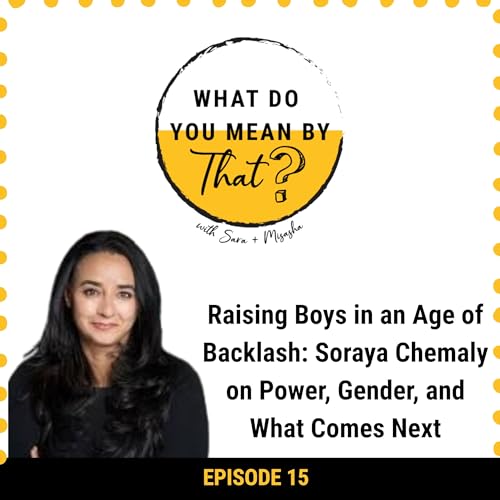In today's episode, we sit down with feminist author and activist Soraya Chemaly for a conversation that feels both urgent and deeply grounding. Soraya's new book, All We Want Is Everything, traces how male supremacy shows up everywhere—our politics, our homes, our faith spaces, our workplaces, and especially in the lives of our children.
Together, we talk about the rising backlash against women and queer people, the ways boys are being pulled into misogynistic online spaces, and why so many young men are drifting toward anti-democratic movements without even realizing they're being manipulated. Soraya offers a powerful reframe for what we're seeing culturally, along with real, everyday actions that families can take to disrupt old gender scripts—on sports fields, around dinner tables, and in the tiny moments we rarely name but constantly repeat.
This conversation is challenging, hopeful, beautifully honest, and filled with the clarity that can actually shift how we move through the world.
Let's dive in.
What to listen for:
-
What inspired Soraya to write this book, now, beyond the backlash from the presidential elections.
-
The one cultural shift she'd want to see in the next decade: Young men understanding that the anti feminism they are largely accepting and in many cases promulgating is a manipulation. "If boys could understand that they, too, are part of progressive movements in a way that allows them to accept women as equals, and that means also equal competitors, for example, in school, then that's what I would want to see. "
-
Specific actions that hold the line for feminists and womanists, and the roles we have to play
-
What practices we all use to sustain ourselves in challenging times
About our guest:
Soraya Chemaly is an award-winning author and activist. As a cultural critic, she writes and speaks frequently about gender norms, social justice, free speech, sexualized violence, politics, and technology. The former Executive Director of The Representation Project and Director and co-founder of the Women's Media Center Speech Project, she has long been committed to expanding women's civic and political participation.
Soraya's most recently released book, All We Want is Everything: How We Dismantle Male Supremacy, has been called "a potent rallying cry for a beleaguered feminist movement." In it, she challenges dearly held beliefs about gender and equality today, drawing clear lines between the dynamics of intimate inequality and global anti-feminist, anti-democratic backlash and machofascism.
Her first book, Rage Becomes Her: The Power of Women's Anger, was recognized as a Best Book of 2018 by the Washington Post, Fast Company, Psychology Today, and NPR, and has been translated into multiple languages. She is a contributor to several anthologies, most recently Free Speech in the Digital Age and Believe Me: How Trusting Women Can Change The World. Soraya is also a co-producer of a WMC #NameItChangeIt PSA highlighting the effects of online harassment on women in politics in America. Her work is widely featured in the media, documentaries, books, and academic research.
As an activist, Ms. Chemaly also spearheaded several successful global campaigns challenging corporations to address online hate and harassment, restrictive content moderation and censorship, and institutional biases that undermine equity and negatively affect free speech.
Before 2010, Ms. Chemaly spent more than fifteen years as an executive and consultant in the media and data technology industries.
 46 m
46 m 26 m
26 m 32 m
32 m Dec 16 202545 m
Dec 16 202545 m 40 m
40 m Nov 18 202546 m
Nov 18 202546 m 58 m
58 m 22 m
22 m
